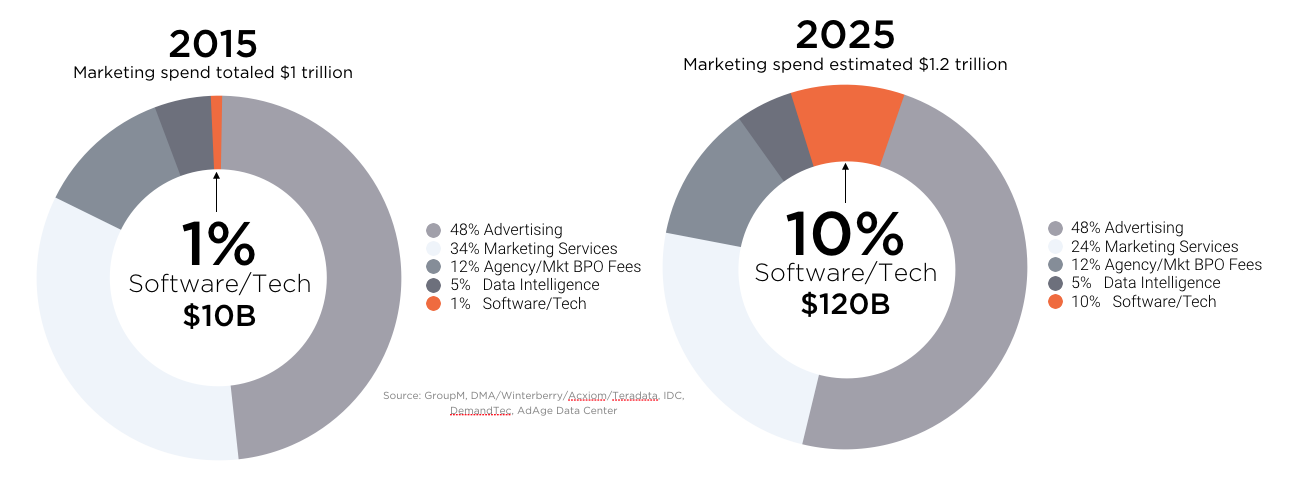The Emergence of Marketing Technology and its effect on Digital Agencies
There is less need for traditional IT and implementation labor by digital agencies.
4.5.2016
Marketing technology is growing and improving rapidly. These new technologies are disrupting traditional marketing services by reducing labor once required for IT management, implementation, and reporting. Digital Agencies who are not transitioning out of these traditional roles are suffering devastating losses.
Marketing Technology is Growing 10x
Right now, marketing technology (MarTech) is in its infancy, and there’s only room to grow. Foundation Capital conducted research with data collected by intelligence firms like the International Data Corporation (IDC) who predict MarTech to grow from a $12B Billion dollar market into a $120B industry-- a growth of 10x in 10 years. This influx of cash will be shifting from the $340B agency marketing services sector. As this significant market reorganization occurs, agencies must evolve to take on different roles in client service - and large businesses will require new roles in order to manage large marketing technology budgets.
Enter the Chief Marketing Technologist
As the marketing landscape continues to embrace advanced technology, CMOs will have to successfully partner with IT in order to meet marketing objectives. Simultaneously, IT must evolve in order to effectively collaborate with technically-oriented marketing teams. In the Harvard Business Review, Scott Brinker predicts that a new role of Chief Marketing Technologist (CMT) will emerge to serve as the connecting officer between marketing and IT. The CMT will be responsible for managing MarTech budgets, relationships with vendors, and relationships with agency partners.
The CMT Agency Relationship
As the role of the CMT becomes more prevalent in organizations, agencies are uniquely poised to embrace the technology mandates that will drive client priorities. The gap between marketing and technology is very real, and as that gap closes, agencies will do one of two things: become stronger client technology partners or lose relevance as the digital landscape outpaces their value. The agency can be an indispensable technology partner as an advisor when CMTs set priorities for marketing, vendor and platform selections, embrace the SaaS solution model, and shift both decision making and implementation away from traditional IT involvement - but only if their knowledge and vision are up to the task.
The Agency Role as a Digital Strategist
When it comes to technology, most businesses are slow to transition. That is why many mid-market companies use agencies as their trusted partner when it comes to technology decisions. Agencies can use this opportunity to adapt as a digital strategist, but the opportunity is a catch-22: if agencies help their clients make smart technology decisions, they will lose revenue opportunity to technology automations. This is neither a great situation for agencies, who traditionally make margin on labor, nor for their clients who will continue to over spend. Will agencies avoid technology to keep revenue or embrace it for their clients' benefit?
I've witnessed digital agencies' apprehension toward new technology on multiple occasions when demonstrating Zesty.io's marketing technology. There is a moment in every demo when the agency realizes software will reduce their revenue opportunity and their client’s dependency. More often than not, the agency instinctively reacts with slander and finds ways to sway their customers into custom implementation on old technology. This is detrimental to their client from both a growth and budget perspective. Agencies who continue with this irresponsible mentality will allow them to survive short term, but will not let them transcend into the future. If the client survives, it will inevitably be educated to make a better decision, and will lose trust in the agency who was once a trusted partner.
Agencies Need to Maintain Trust while Providing Value

A poor technology decision will result in a business pouring hundreds of thousands of dollars into technology debt. When the business leaders realize this, they will not trust the agency with their next technology decision, and most likely will seek a new vendor for creative as well. The front loaded revenue the agency made on implementation then results in a loss down the road. This loss would not occur if the agency made a better software decision, but on the flip side, the agency losses revenue opportunity. The challenge for agencies is to stay relevant while new technology decisions are cannibalizing revenue opportunities.
"We are entering a world where digital innovation is merging with traditional marketing fundamentals to create new approaches, new brand leaders, and new models for success."
— David Cooperstein of Forrester Research
The hard and simple fact is that the days of large margin on digital implementation are limited because of new technology. Digital implementation should no longer be seen as a revenue opportunity because digital is no longer a barrier. This change can be correlated to video, as video used to be very expensive to create. Now agencies' focus is about the content of video and its placement. In the same fashion, agencies need to shift focus of content marketing to a digital world, and the creative strategies behind it. By adopting new technology, agencies can shift their revenue opportunities back to producing great marketing campaigns. Do not let the loss of implementation revenue guide choices for your clients. Embrace new technology solutions and get creative again.

